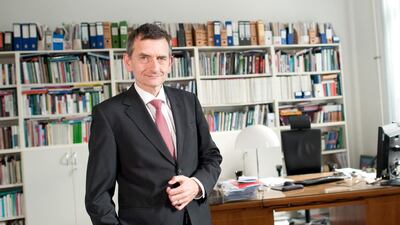The UN’s new special envoy to Sudan arrived in Khartoum on Tuesday to begin a role that will include helping the country’s transition to democracy.
Volker Perthes will lead the UN's Integrated Transition Assistance Mission in Sudan, which will advise authorities on the country's transition to democracy after dictator Omar Al Bashir was overthrown in 2019.
The mission will also rally and co-ordinate international support for Sudan's efforts to reform its battered economy and boost efforts to bring peace to a country that is home to more than 40 million people.
The mission was formed in June last year and has a year-long mandate from the UN Security Council.
Mr Perthes' arrival could help ease Sudan's bumpy shift to democracy at a time when relations between the military and civilian components of its transitional government are tense.
His appointment came after UN experts on Monday urged Sudan to do more to protect civilians, including the hundreds of thousands who fled violence in two areas of Darfur last month.
At least 235 people were killed, nearly 300 wounded and at least 50,000 displaced as a result of the violence, according to the Darfur branch of the country's doctors' union.
"Justice, accountability and reparation to victims are essential to address insecurity, prevent further violence and displacement, and support durable solutions for internally displaced persons," the UN Human Rights Office said.
The violence in Darfur, the worst in years, pitted nomadic Arab tribesmen against ethnic African farmers.
Relations between the two sides have been fraught for decades, mostly over control of grazing lands or the incursion of cattle herds into farmland.
That enmity was exacerbated by an anti-government rebellion in the 2000s by mostly ethnic Africans who demanded equality and an end to what they considered the monopoly of power by a small clique of Arabised Muslims in northern Sudan.
The rebellion was crushed by Al Bashir's government, which deepened Darfur's ethnic schism by allowing Arabs a free hand to fight the rebels and turning a blind eye to atrocities against civilians.
About 300,000 people were killed in that conflict and more than two million were displaced.
Sudan said it intended to hand Al Bashir to the International Criminal Court to stand trial after his indictment a decade ago for crimes against humanity and war crimes in Darfur.
He is currently serving a two-year prison sentence for corruption and is being tried on charges of overthrowing an elected government in 1989 and ordering the deaths of protesters in the months before he was overthrown.


